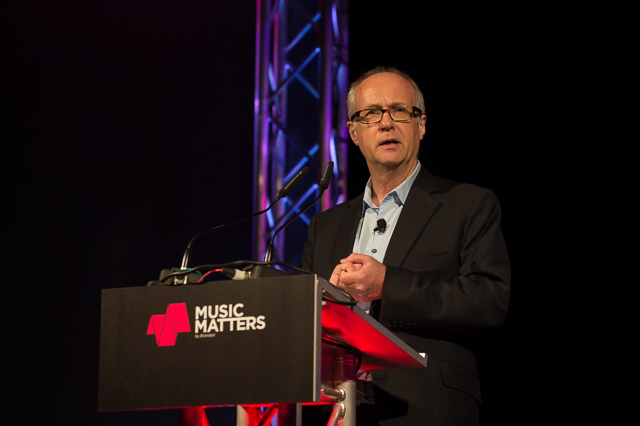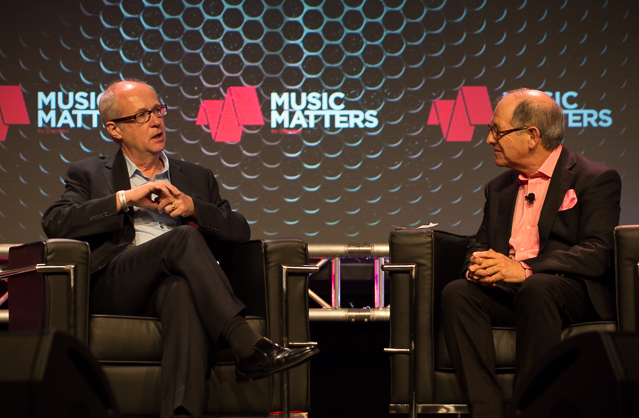
Janice Koh kick started the second day of Music Matters as it moved into the Ritz Carlton ballroom, in front of a packed out room. The Nominated Member of Parliament talked about the actions the Singapore government are taking to work against piracy websites alongside the successes of Singapore bands at events internationally like Canadian Music Week.
Janice also outlined what she is proposing for the future of the industry, “if we want to transform a Singapore music scene into a Singapore music industry, we need: a radio broadcast quota for local music, a strong export strategy and a central agency to promote excellence in the industry.”
Ralph Simon followed with his anticipated and highly informative keynote interview with Max Hole, the Chairman and CEO of the Universal Music Group (UMG) International. Max reflected on what gave birth to his love in music, “Please Please Me” by The Beatles was the first record I bought and it started my romance with music.”

He also talked about the present, “It’s exciting time of change in the industry and I’m glad to be a part of it is, ” and the importance his company places on a local repertoire, “UMG’s success is built on a bedrock foundation of A&R and support of local music.”
The support of local music extends to the domestic Asian markets, which Max detailed, looking at the challenges and opportunities unique to the region. He called Indonesia a “great opportunity, with 285 million phone subscribers in a country with a population of 240 million and 75 million people online.”
Looking at China, he sees the region as “a testing ground of testing the business models of the future. The traditional model we’d come to know in Japan and in Western society has never existed in China. Investing in local artists in china has to be the basis for future growth. We need to back the music ecosystem as a whole, and understand it better.”
He called it “The 1 Billion Person Challenge.”
As for the Japanese market, which remains 80% physical, “Japan is a country with digital savvy, high disposable income and law abiding users. It has every reason to be a leader again. We have to do away with day and date releases of music and hold back. We have to actively work together to above all listen to what the people want. A healthy Japan means a healthy global business.”
And as for the role companies like UMG play in the region, “It’s important we don’t put short term revenue game in front of long term business development. We want our local artists to build a career they can be proud of.”
This informative conversation was followed by another, the President International and Emerging Markets from Live Nation Entertainment, Alan Ridgeway, interviewed by Rob Schwartz, the Tokyo Bureau Chief for Billboard Magazine.
Alan looked at the unique challenges of touring the Asian market, as well as the potential for the region in the future. Speaking to bands outside the region, he commented that a lot of bands wait too long before they tour Asia, to the point where it becomes too expensive and too difficult to tour successfully. Bands need to put the ground work in here as much as they would in any other region.
Following a “Caffeine Matters” break and performances from breakthrough Philippine artist Fresh and Taiwan’s MC HotDog, interviewer Mandar Thakur from Times Music sat down with Mary Megan Peer, the Asia Pacific President of peermusic.
peermusic is known as “one of the last standing global, family owned, independent music companies”, offering boutique services but we try to offer the things the big ones can with international exposure… as Mary Megan Peer put it, “we’re small enough that we all still talk to each other”. In the business for 80 years, peermusic have a “small but growing Asian catalogue… we recently got our first Mainland China wrtiers… we also look at it as a huge growth opportunity for Anglo music, as we actively sign local writers and look for possible collaborations and collect royalties for our western artists.”
The final panel before lunch was “Managers Matters”, a debate with some of the most successful managers in the world, moderated by Vince Bannon from Getty Images. He was joined by Benjy Gringberg from Rostrum Records, whose success stories include Mac Miller and Wiz Khalifa. Mac Miller made headlines in America as the first independent artist to make it to number one on the Billboard charts in 20 years, second in history – all of this achieved without radio support. “This success showed Macklemore (another successful American hip-hop artist) the blueprint and encouraged him to stay independent.”
Lee Trink from Dare Mighty Entertainment, talked about the success of his client Kid Rock’s 2013 American tour, which set every ticket price at $20, “compared to our 2011 tour, we increased our average nightly audience size by 6,000 and we made more money on the tour.”
Meanwhile, reformed entertainment lawyer Bernard Cahill of ROAR looked at the success of his artists like Dwight Yoakim and Zac Brown, and reformed accountant Brian Message of ATC and MMF talked more broadly about the changing role of the manager. “Back in the 90’s we were representatives of an artist for record label meetings. Now we’re essentially the chief executives of an artist’s business… managing revenue streams of their music and all their other disciplines, including AV and global operations.”
The message from this? The power has shifted from labels to artists and their managers.
Stay tuned to the AU for more from Music Matters in Singapore through the weekend!
